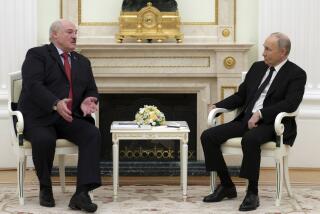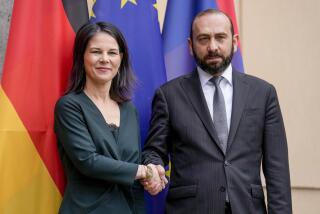Bonn-Soviet Ties Warmer, but No Summit Is Planned
- Share via
BONN — Soviet Foreign Minister Eduard A. Shevardnadze on Tuesday ended a three-day visit that brought improvement in Moscow’s damaged relations with West Germany but failed to produce agreement on a visit to Bonn by Soviet leader Mikhail S. Gorbachev in the first half of this year.
Shevardnadze described his meetings with West German leaders, including Chancellor Helmut Kohl, as “useful and successful.” Nevertheless, he rejected Kohl’s invitation for an early Gorbachev visit. He agreed only that the Kremlin would decide on a date in the second half of the year for a Gorbachev-Kohl meeting in either Moscow or Bonn.
“It’s a snub to Kohl,” a Western analyst commented.
De Facto Spokesman
Kohl had pressed for a visit before July, when West Germany is to relinquish the presidency of the European Communities. This would have made it possible for him to receive Gorbachev as the de facto spokesman for much of Western Europe.
Nevertheless, Shevardnadze’s call for agreements to scrap short-range tactical nuclear missiles in Europe and eliminate chemical weapons struck a responsive chord with West German public opinion. And his expressed interest in expanding bilateral trade as a means of furthering Gorbachev’s plans to revitalize the Soviet economy pleased West German industrial leaders.
Edge of the Divide
After nearly nine hours of talks, Shevardnadze and the West German foreign minister, Hans-Dietrich Genscher, signed three diplomatic protocols. They call for establishing consulates in Kiev and Munich, for extending an economic cooperation agreement and for expanding high-level diplomatic contacts by holding annual meetings of their foreign ministers.
For many, the success of Shevardnadze’s visit, the first by a Soviet foreign minister to Bonn in five years, had as much to do with style as with substance. As a people living on the edge of the East-West divide, weaned on the truculence of former Foreign Minister Andrei A. Gromyko, West Germans responded positively to Shevardnadze’s polished, open approach.
For example, people who were present when Shevardnadze met Monday with a group of West German industrial leaders described his 40-minute presentation as direct, candid and informative.
“There wasn’t a question he dodged,” said Peter Blume, spokesman for the German Trade and Industry Assn. “He made a very good impression.”
West Germany is the Soviet Union’s largest trading partner in the West. Bilateral trade amounts to more than $11 billion a year. But relations between the two countries soured in October, 1986, after Kohl, in an interview with Newsweek magazine, compared Gorbachev with Joseph Goebbels, the propaganda chief in Nazi Germany.
Contact Re-Established
Moscow promptly called off several planned official visits, and not until last summer was high-level contact re-established with a visit to Moscow of West German President Richard von Weizsaecker.
Shevardnadze’s style of diplomacy may have been a refreshing change, but his tactic of attempting to drive a wedge between West Germany and its Atlantic Alliance partners appeared to be only a more subtle form of the pressure Moscow has exerted in the past.
With 17 million Germans in East Germany and 2 million ethnic Germans in the Soviet Union, Moscow has long believed that Bonn could be susceptible to pressure to agree to its arms reduction proposals.
Shevardnadze’s call for the elimination of tactical nuclear missiles from Europe, issued at a formal banquet Monday evening, came against a backdrop of deepening differences between West Germany and its allies in the North Atlantic Treaty Organization about the role of such weapons.
The West Germans are acutely aware that in the event of war, the overwhelming share of the estimated 1,500 tactical missiles deployed across the East-West frontier would fall on German soil.
Since the United States and the Soviet Union signed a treaty last month calling for the elimination of ground-launched intermediate-range missiles, West German interest has focused on drastically reducing the level of tactical weapons, even though NATO policy calls for upgrading them.
On Tuesday, Shevardnadze denounced NATO’s modernization plans, warning that they could undermine the momentum in arms control.
“This would be a very dangerous trend,” he said. “It must not be allowed to occur.”
Aware of the West German belief that early agreement on banning the possession or use of chemical weapons is now possible, Shevardnadze implied that the Reagan Administration is delaying such an agreement because, unlike Europe, the United States would not be a chemical warfare battleground.
U.S. arms control experts contend that verification problems are holding up agreement in this area.
Genscher and Shevardnadze issued a joint statement calling for an early ban on chemical weapons. It said that “accord is so close, there is no going back.”
More to Read
Sign up for Essential California
The most important California stories and recommendations in your inbox every morning.
You may occasionally receive promotional content from the Los Angeles Times.










